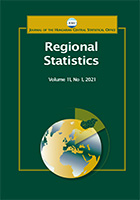The impact of language and quality education on regional and economic development: a study of 99 countries
The impact of language and quality education on regional and economic development: a study of 99 countries
Author(s): Osama Alhendi, Gyula Fodor, Péter Balogh, Fredrick Collins Adol Gogo, Lóránt Dénes DávidSubject(s): Social Sciences, Economy, Geography, Regional studies
Published by: Központi Statisztikai Hivatal
Keywords: economic growth; regional development; quality education; language education; english proficiency
Summary/Abstract: Language and quality education play an important role in enhancing the development of regions and economies. Education systems and language policies implemented by different countries depend upon their individual political, cultural, historic, and economic characteristics. However, it is important for each country to achieve a degree of harmony between their education and language policies (as is the case of Singapore and Ireland). This could help to improve their economic performance and accelerate the wheels of development. To investigate the impact of quality education and language on different regions and economies, this study used panel data from 99 non-English speaking economies during 2009–2017 period. Following the approach of Barro (1991) and Mankiw et al. (1992), a baseline model was augmented (Augmented Solow model) to include language and quality education indicators. In addition, the model was estimated using the Two-step system GMM test. The test also determined which variables could have a long-term impact on the development of the listed panel data (using STATA 15 software). The findings and estimations reveal that language and quality education have a positive impact on the regions and their economic growth. The impact of primary education quality is more significant than the impact of secondary education quality, while the impact of the English language on the development process is positive but not significant. The policy implications are that decision makers should adopt language policies which complement the education system and the economic strategy of the country.
Journal: Regional Statistics
- Issue Year: 11/2021
- Issue No: 01
- Page Range: 42-57
- Page Count: 16
- Language: English

